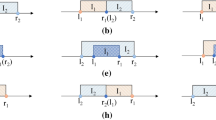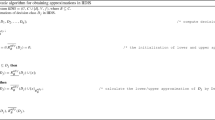Abstract
With the rapid development of information technology, numerous mixed data are collected, which often leads to incomplete data due to human and nonhuman factors. The data in an actual information system often evolve dynamically with time. The modification of data values and the addition and deletion of objects are common dynamic variations in data sets, which usually occur simultaneously. With dynamic changes of data, static methods of knowledge acquisition require recalculated from scratch, resulting in repeated calculations and greater time consumption. Aiming to address the above multi-dimensional dynamic variations in data values and object sets under mixed incomplete data, this paper studies strategies and methods of dynamically updating three-way regions (viz. positive, negative and boundary regions) based on a matrix. First, for a hybrid incomplete decision system (HIDS), we develop a hybrid normalized distance metric for objects and present a matrix-based method of calculating positive, boundary and negative regions. For cases of modifying attribute values and adding and deleting object sets concurrently, the incremental mechanisms of the maintenance of three-way regions are researched for the multi-dimensional dynamic variations of HIDS; meanwhile, we develop a matrix-based incremental algorithm to update three-way regions. A series of experiments implemented on nine UCI data sets demonstrate that the proposed dynamic algorithm is superior to the static algorithm for handling the multi-dimensional dynamic variations of the HIDS.








Similar content being viewed by others
Change history
19 July 2022
A Correction to this paper has been published: https://doi.org/10.1007/s10489-022-03906-5
References
Pawlak Z (1982) Rough sets. Int J Comput Inform Sci 11(5):341–356
Fujita H, Gaeta A, Loia V, Orciuoli F (2019) Resilience analysis of critical infrastructures: a cognitive approach based on granular. IEEE Transac Cybern 49(5):1835–1848
Liu KY, Yang XB, Fujita H et al (2019) An efficient selector for multi-granularity attribute reduction. Inf Sci 505:457–472
Luo JF, Fujita H, Yao YY et al (2020) On modeling similarity and three-way decision under incomplete information in rough set theory. Knowl-Based Syst 191:105251
Yang X, Li YJ, Liu D et al (2021) Hierarchical fuzzy rough approximations with three-way multi-granularity learning. IEEE Trans Fuzzy Syst. https://doi.org/10.1109/TFUZZ.2021.3117449
Ye J, Zhan JM, Ding WP et al (2022) A novel three-way decision approach in decision information systems. Inf Sci 584:1–30
Lin TY (1986) Rough sets, neighborhood systems and approximation. World J Surg 10(2):189–194
Tang WY, Mao KZ (2007) Feature selection algorithm for mixed data with both nominal and continuous features. Pattern Recogn Lett 28:563–571
Hu QH, Yu DR, Liu JF et al (2008) Neighborhood rough set based heterogeneous feature subset selection. Inf Sci 178:3577–3594
Chen HM, Li TR, Cai Y et al (2016) Parallel attribute reduction in dominance-based neighborhood rough set. Inf Sci 373:351–368
Chen HM, Li TR, Fan X et al (2019) Feature selection for imbalanced data based on neighborhood rough sets. Inf Sci 483:1–20
Zhao H, Qin KY (2014) Mixed feature selection in incomplete decision table. Knowl-Based Syst 57:181–190
Zhang JB, Li TR, Chen HM (2014) Composite rough sets for dynamic data mining. Inf Sci 257:81–100
Sun L, Wang LY, Ding WP et al (2020) Neighborhood multi-granulation rough sets-based attribute reduction using Lebesgue and entropy measures in incomplete neighborhood decision systems. Knowl-Based Syst 192:105373
Wang P, Zhang PF, Li ZW (2019) A three-way decision method based on Gaussian kernel in a hybrid information system with images: an application in medical diagnosis. Appl Soft Comput 77:734–749
Hu J, Li TR, Luo C et al (2017) Incremental fuzzy probabilistic rough sets over two universes. Int J Approx Reason 81:28–48
Huang QQ, Li TR, Huang YY et al (2020) Incremental three-way neighborhood approach for dynamic incomplete hybrid data. Inf Sci 541:98–122
Liu Y, Zheng LD, Xiu YL et al (2020) Discernibility matrix based incremental feature selection on fused decision tables. Int J Approx Reason 118:1–26
Luo C, Li TR, Yi Z et al (2016) Matrix approach to decision-theoretic rough sets for evolving data. Knowl-Based Syst 99:123–134
Yang L, Qin KY, Sang BB et al (2021) Dynamic fuzzy neighborhood rough set approach for interval-valued information systems with fuzzy decision. Appl Soft Comput 111:107679
Hu CX, Zhang L (2020) Incremental updating probabilistic neighborhood three-way regions with time-evolving attributes. Int J Approx Reason 120:1–23
Huang QQ, Li TR, Huang YY et al (2020) Dynamic dominance rough set approach for processing composite ordered data. Knowl-Based Syst 187:104829
Yu JH, Chen MH, Xu WH (2017) Dynamic computing rough approximations approach to time-evolving information granule interval-valued ordered information system. Appl Soft Comput 60:18–29
Yang X, Liu D, Yang XB et al (2021) Incremental fuzzy probability decision-theoretic approaches to dynamic three-way approximations. Inf Sci 550:71–90
Zhang XY, Li JR, Mi JS (2022) Dynamic updating approximations approach to multi-granulation interval-valued hesitant fuzzy information systems with time-evolving attributes. Knowl-Based Syst 238:107809
Luo C, Li TR, Huang YY et al (2019) Updating three-way decisions in incomplete multi-scale information systems. Inf Sci 476:274–289
Xie XJ, Qian XL (2018) A novel incremental attribute reduction approach for dynamic incomplete decision systems. Int J Approx Reason 93:443–462
Zhang QH, Lv GX, Chen YH et al (2018) A dynamic three-way decision model based on the updating of attribute values. Knowl-Based Syst 142:71–84
Chen HM, Li TR, Luo C et al (2015) A decision-theoretic rough set approach for dynamic data mining. IEEE Trans Fuzzy Syst 23(6):1958–1970
Huang YY, Li TR, Luo C et al (2017) Matrix-based dynamic updating rough fuzzy approximations for data mining. Knowl-Based Syst 119:273–283
Wang S, Li TR, Luo C et al (2016) Efficient updating rough approximations with multi-dimensional variation of ordered data. Inf Sci 372:690–708
Wang S, Li TR, Luo C et al (2019) Domain-wise approaches for updating approximations with multi-dimensional variation of ordered information systems. Inf Sci 478:100–124
Wang S, Li TR, Luo C et al (2020) A novel approach for efficient updating approximations in dynamic ordered information systems. Inf Sci 507:197–219
Ge H, Yang CJ, Xu Y (2022) Incremental updating three-way regions with variations of objects and attributes in incomplete neighborhood systems. Inf Sci 584:479–502
Yang X, Li TR, Liu D et al (2017) A unified framework of dynamic three-way probabilistic rough sets. Inf Sci 420:126–147
Shu WH, Qian WB, Xie YH (2020) Incremental feature selection for dynamic hybrid data using neighborhood rough set. Knowl-Based Syst 194:105516
Sang BB, Chen HM, Li TR et al (2020) Incremental approaches for heterogeneous feature selection in dynamic ordered data. Inf Sci 541:475–501
Yang YY, Song SJ, Chen DG et al (2020) Discernible neighborhood counting based incremental feature selection for heterogeneous data. Int J Mach Learn Cybern 11(5):1115–1127
Zeng AP, Li TR, Hu J et al (2017) Dynamical updating fuzzy rough approximations for hybrid data under the variation of attribute values. Inf Sci 378:363–388
Huang YY, Li TR, Luo C et al (2020) Dynamic maintenance of rough approximations in multi-source hybrid information systems. Inf Sci 530:108–127
Wang L, Yang X, Chen Y, Liu L, An S, Zhuo P (2018) Dynamic composite decision-theoretic rough set under the change of attributes. Int J Computa Intel Syst 11:355–370
Ziarko W (1993) Variable precision rough set model. J Comput Syst Sci 46:39–59
Slezak D, Ziarko W (2005) The investigation of the Bayesian rough set model. Int J Approx Reason 40:81–91
Yao YY (2010) Three-way decisions with probabilistic rough sets. Inf Sci 180:341–353
Hu CX, Zhang L (2020) A dynamic framework for updating neighborhood multigranulation approximations with the variation of objects. Inf Sci 519:382–406
Jing YG, Li TR, Fujita H et al (2018) An incremental attribute reduction method for dynamic data mining. Inf Sci 465:202–218
Yang X, Li MM, Fujita H et al (2022) Incremental rough reduction with stable attribute group. Inf Sci 589:283–299
Acknowledgments
Research on this work is partially supported by the National Science Foundation of China (No. 62076002), by the Natural Science Foundation of Anhui Province (Nos. 2108085MF215 and 2008085MF224), by the Higher Education Natural Science Foundation of Anhui Province (No. KJ2020ZD63), and by the Key Laboratory of Computation Intelligence and Signal Processing of Education Ministry Foundation.
Author information
Authors and Affiliations
Corresponding author
Additional information
Publisher’s note
Springer Nature remains neutral with regard to jurisdictional claims in published maps and institutional affiliations.
The original online version of this article was revised: Contains three mistakes due to the transformation document being edited through different formulas. The presentation of Definition 5, Theorem 3 and Table 3 were incorrect.
Rights and permissions
About this article
Cite this article
Yang, C., Ge, H. & Xu, Y. Incremental maintenance of three-way regions with variations of objects and values in hybrid incomplete decision systems. Appl Intell 53, 3713–3735 (2023). https://doi.org/10.1007/s10489-022-03736-5
Accepted:
Published:
Issue Date:
DOI: https://doi.org/10.1007/s10489-022-03736-5




